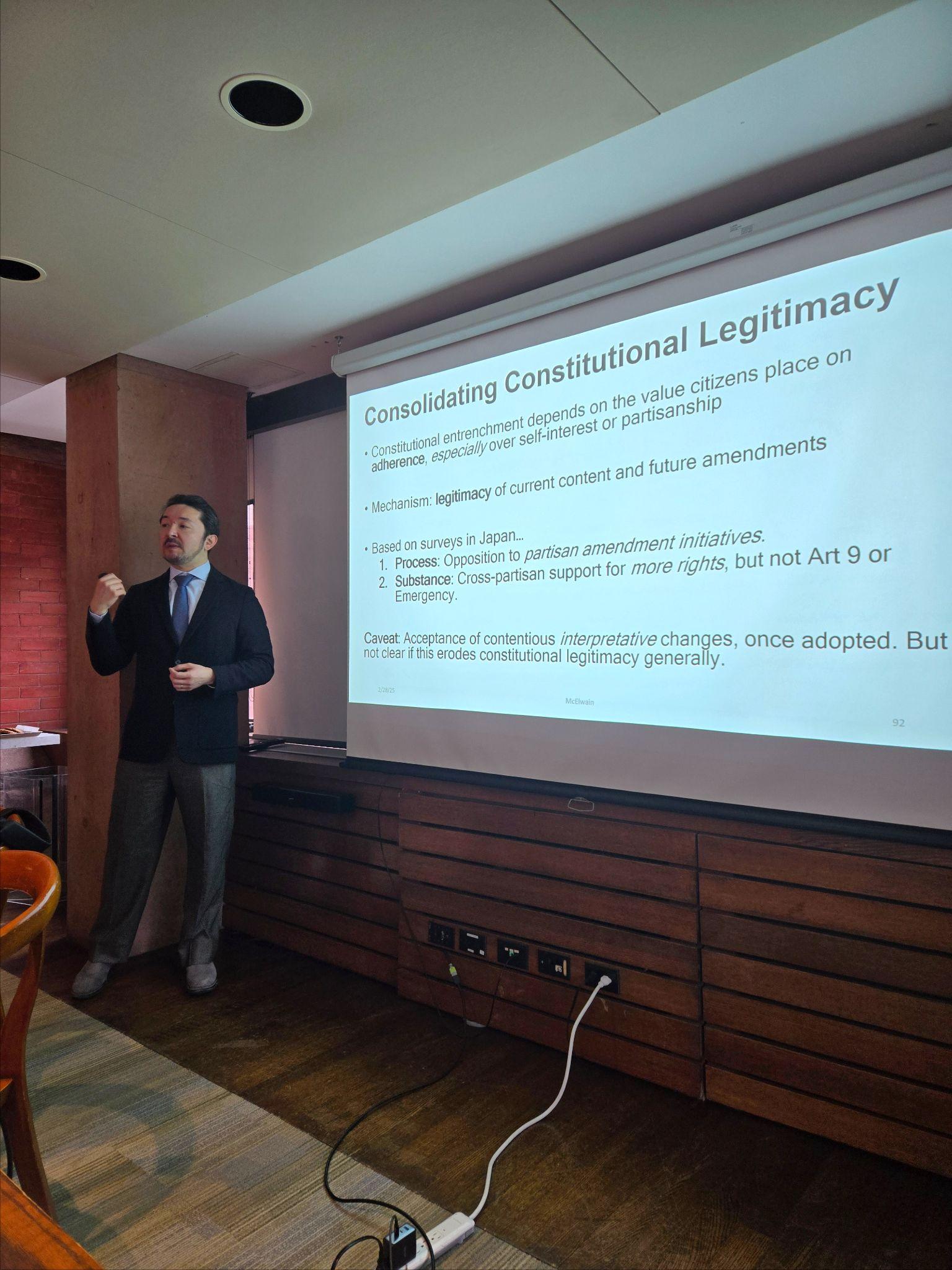Japan finds itself in a unique position in the world order as having the oldest unamended Constitution in the world. In conjunction with the Centre for the Study of Global Japan (CSGJ), the Munk School hosted an event about Japanese people and their feelings about their Constitution. The event was chaired by Phillip Lipscy, the director of the CSGJ, with Professor Kenneth Mori McElwain, a visiting professor at Columbia University and a professor of comparative politics at the University of Tokyo, as the keynote speaker. Professor McElwain’s research primarily focuses on comparative politics, and he is the leading expert on the Japanese Constitution. He earned his BA from Princeton University and completed a PhD at Stanford. Since then, his research has appeared in leading journals like the American Journal of Political Science. He authorizes the award-winning book The University and Original of the Japanese Constitution in Quantitative Perspective.
The Japanese Constitution, as it currently stands, is the oldest unamended Constitution in the world. This is quite abnormal, as the idea of a constitution evolved over time to reflect shifting societal values across generations. Independent of historical or cultural factors, Professor McElwain argues there are likely to be structural pressures that necessitate constitutional change. He explains that systems of inequality or high levels of environmental degradation eventually will foment a change. If this is true, the question becomes: how has Japan managed to sidestep the structural factors surrounding constitutional reforms? Professor McElwain points out two potential reasons. First, Japan’s Constitution is extremely vague, allowing for many possible interpretations. Second, it protects various citizens’ rights. These two factors allow for the Constitution to persist despite its lack of an amendment process.
This does not necessarily mean the Constitution is perfect, however. Over the years, the legitimacy and longevity of the Constitution come under direct scrutiny. Professor McElwain notes that for constitutions to have legitimacy, there must be an acceptance of its principles and a credible threat of punishment if said principles are to be breached. This requirement is an issue, as the longevity of the Constitution then becomes a difficulty. The absence of amendments creates doubt in the document’s role to uphold the important democratic principles that a constitution should. Based on this understanding, Professor McElwain’s research highlights three key lessons learned from his research regarding the amendment of the Japanese Constitution. The first is regarding the procedure of constitutional change itself. The second is concerning the actual content of the amendment. Lastly, even if amendments are not formal nationally, there are informal ways to achieve benefits.
The procedure of constitutional amendments in the status quo is explicit and ensures a degree of stability to constitutions. There are many common elements, such as the requirement of a two-thirds supermajority, national referendums, or multiple stages of review. Professor McElwain explains how Japan requires a two-thirds supermajority and a simple majority in a national referendum. He also describes how this process in Japan is a point of criticism. Several important political dynamics emerge from this critique. First, the division between political parties is often a driving factor that impacts the feasibility and nature of amendments such that only nonpartisan amendments are likely to pass. Second, public opinion plays a crucial role as perceptions of the Constitution and proposed amendments significantly influence political debate and outcomes. Public opinion is particularly important because the applicability of these amendments is only viable if accompanied by a commensurate sense of legitimacy. There is a sense of disagreement among political elites about the national referendum policy, specifically surrounding its high bar of a two-thirds supermajority. In his research, Professor McElwain presents two conclusions surrounding this topic. First, in his interviews with the general public, it becomes clear that the two-thirds supermajority and the national referendum, while high, are quite popular despite the difficulties. Second, this combination is not unique to Japan; other countries also adopt similarly high thresholds, suggesting that while the bar is high, it is neither unprecedented nor impractical. Crucially, these findings indicate that the public generally accept, and even values, the current process of constitutional amendments.
If the process of amendments is not the challenge, the issue may lie in the content itself. Professor McElwain emphasizes that substance plays an important role in garnering public support in two key ways. First, the nature of the policy matters—amendments are more likely to gain traction if they address issues that people deem to be proximate or personally relevant. Second, the political party proposing the amendment influences how the policy is received. Professor McElwain explains—when addressing the substance of the policy—that people are more likely to accept certain changes over others. For example, people generally prefer the increase or preservation of fundamental rights. This makes sense as these issues are often very proximate for individuals, especially when they provide positive benefits. These rights issues often concern perceived flaws or omissions, adaptations to social changes, or general political progress. This characterization is untrue of other policies, such as Article 9, which renounced the country’s war potential. Many interpretations spread around Japan, and notably, the more extreme versions of this interpretation that would allow for war under the guise of national defence fall under heavy scrutiny. This scrutiny shows that bipartisan issues or proposals generally receive much broader support than partisan issues. The second factor is the party that proposes the amendments. Professor McElwain explains that, as part of his research, he used major party names and objective, third-party names to see if the party proposing the policy was important to voters’ psyche. He found that the most extreme policies were still objectionable but that the more moderate, bipartisan policy was much more acceptable if it came from an “independent third party.” This indicates two key lessons. First, bipartisanship and bipartisan issues will generally receive more support. Second, perceptually bipartisan policies will receive more scrutiny and backlash based on what party proposes them. These conclusions suggest that a political will exists for constitutional reform, but that individual biases remain as roadblocks.
The last talking point highlights the prevalence of informal amendment and the acceptance of changes in interpretation without necessarily changing the official wording. Acceptance is fundamental to the legitimacy of the Constitution because without it, there is a lack of stability and democratic governance. This principle suggests that while the written law is important, acceptance trumps all else, which is especially true when discussing Japan’s informal policies. Again, the prime example is Article 9, whose interpretation has changed over time. In its traditional sense, the provision entirely prohibits using force but allows a minimum level of defence. In 2014, this definition was challenged, and Japan was allowed to use its forces to protect an ally. Again, in 2015, this definition was challenged to enable minimum actions to secure Japan’s survival. These are prime examples of informal amendments that, while technically skirting the law, were accepted and thus faced minimal backlash. These actions notably allowed the country to adapt to modernity while simultaneously staying faithful to the existing Constitution. Other methods exist, such as going through lower courts where the bar is much lower to enact change. Thus, a wide variety of methods may generate informal constitutional amendments without physically amending the Constitution. McElwain’s research demonstrates that as long as a policy is reasonable and popular, reinterpretation and alternatives to the amendment process are still accepted and legitimized by the Japanese population.
Ultimately, Professor McElwain thoroughly explains the current political climate surrounding constitutional amendments in Japan. He explains that the current process is standard and quite popular. He also notes that certain policies gain more support than others, with important bipartisan policies receiving overwhelming support in concept but becoming less popular when attributed to political parties. Lastly, he explains that even without legitimate amendments, the Japanese people can still adapt and achieve political progress.
Brandon Zhang is a third-year political science student with a focused interest in immigration policy and East Asian studies, particularly on issues relating to China, Taiwan, and North and South Korea. His studies reflect a dedication to understanding complex geopolitical dynamics and the evolving role of immigration in shaping societies.








